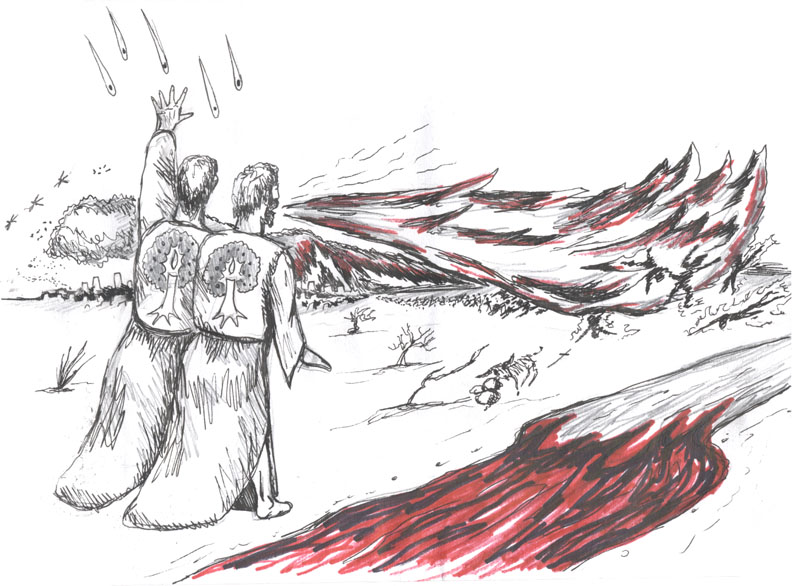Question
Dear Gramps,
I’ve had a question that has bothered me for some time. When the Savior returns for His second coming, what is going to happen to all of the outstanding debt that is owed by one party to another here in this life? Because I assume our financial systems will be done away with. For example, I may have a student loan that is not completely paid off, or my neighbor may have a house or a car that is not completely paid off. Is the creditor just expected to just shrug his shoulders and lose his just compensation and reimbursement? I’ve always thought that Christ wanted us to pay our just debts, and not just “blow them off.” Any thoughts on this?
Robert
Answer
Dear Robert,
I don’t think we’ve been told with any certainty what the economic system of the Millennium will be. The Doctrine and Covenants contains the principles of the United Order, which principles govern the law of consecration. But principles provide a wide range of latitude for implementation. What’s more, whatever economic system we’ll have needs us to work out the kinks. Joseph Smith and Brigham Young took the idea of a New Jerusalem quite literally. For them the doctrine meant they needed to be city builders. They learned what it meant to govern a city, what infrastructure deserved attention, how to set the culture, and what the layout should be. Their thoughts seemed to be that when the Second Coming finally occurred, Zion would already be set up and we would be ready to roll out on a large scale. When the early implementations of the United Order failed, Brigham Young began experimenting with co-ops as a bridge to the revealed economic principles of unity, industry, and thrift. All that is to say, that I’m not certain that debts will be immediately forgiven upon the return of the Savior.
Having said all that, there is a scriptural argument that debtors may be relieved at the onset of the Millennium. Under the Mosaic Law, not only was Israel to honor the Sabbath day once every seven days, they were also to honor a sabbatic year once every seven years! The relevant part here is that all debts were forgiven at this point. Note that it also comes with a caveat:
“At the end of every seven years thou shalt make a release.
And this is the manner of the release: Every creditor that lendeth ought unto his neighbour shall release it; he shall not exact it of his neighbour, or of his brother; because it is called the Lord’s release.
Of a foreigner thou mayest exact it again: but that which is thine with thy brother thine hand shall release” (Deuteronomy 15:1-3).
The Millennium is the Sabbath of the world, so it stands to reason that there will be some sort of similar debt forgiveness program. But even here, there’s uncertainty, because I don’t know if you or your neighbor would fall under the brother (where it is completely forgiven) or the foreigner clause (where it is merely deferred).
Add to that uncertainty the principle of integrity. Zion is the “pure in heart”, these people will meet their obligations. Elder Wirthlin described this ideal, “we believe in honoring our debts and being honest in our dealings with our fellow men,” and gave the following example:
“In the 1930s Fred Snowberger opened the doors of a new pharmacy in northeastern Oregon. It had been his dream to own his own business, but the economic turnaround he had hoped for never materialized. Eight months later, Fred closed the doors of his pharmacy for the last time.
Even though his business had failed, Fred was determined to repay the loan he had secured. Some wondered why he insisted on repaying the debt. Why didn’t he simply declare bankruptcy and have the debt legally forgiven?
But Fred did not listen. He had said he would repay the loan, and he was determined to honor his word. His family made many of their own clothes, grew much of their food in their garden, and used everything they had until it was thoroughly worn out or used up. Rain or shine, Fred walked to and from his work each day. And every month, Fred paid what he could on the loan.
Years passed and finally the wonderful day arrived when Fred made the last payment. He delivered it in person. The man who had loaned him the money wept and with tears streaming down his face, said, “You not only paid back every penny, but you taught me what a man of character and honesty is.”
To this day, nearly 70 years after Fred signed his name to that note, descendants of Fred and Erma Snowberger still tell this story with pride. This act of honor and nobility has lived through the decades as a cherished example of family integrity.” (Earthly Debts, Heavenly Debts, April 2004 General Conference).
So don’t bank on Christ’s coming as granting you a reprieve from your financial obligations. As you noted, while not having to pay your debts would be helpful to you, it could be quite harmful to the creditor. I’m sure you feel your debts as a burden – and quite rightly so. They are a tremendous weight to carry. Church leaders ancient and modern have compared it to slavery. Conversely, paying them off can change your entire attitude and demeanor. President Hinckley shared one such example in the October 1998 General Conference:
“President Faust would not tell you this himself. Perhaps I can tell it, and he can take it out on me afterward. He had a mortgage on his home drawing 4 percent interest. Many people would have told him he was foolish to pay off that mortgage when it carried so low a rate of interest. But the first opportunity he had to acquire some means, he and his wife determined they would pay off their mortgage. He has been free of debt since that day. That’s why he wears a smile on his face, and that’s why he whistles while he works.” (To the Boys and to the Men).
In your journey towards financial self-reliance, The Church of Jesus Christ of Latter-day Saints has provided some useful resources. Take a look at the Provident Living site for suggestions on improving your career path or better managing the finances you’re already receiving. You can also find encouragement from this Ensign article “Getting Out of Debt – for Good“. It mentions a debt elimination plan called the “debt snowball” to help you feel the momentum you gain as you pay off your debts.
Gramps







